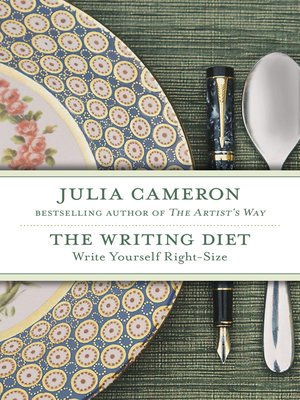
Sign up to save your library
With an OverDrive account, you can save your favorite libraries for at-a-glance information about availability. Find out more about OverDrive accounts.
Find this title in Libby, the library reading app by OverDrive.



Search for a digital library with this title
Title found at these libraries:
| Library Name | Distance |
|---|---|
| Loading... |
From the bestselling author of The Artist's Way, a revolutionary diet plan: Use art to take off the pounds!
Over the course of the past twenty-five years, Julia Cameron has taught thousands of artists and aspiring artists how to unblock wellsprings of creativity. And time and again she has noticed an interesting thing: Often, in uncovering their creative selves her students also undergo a surprising physical transformation-invigorated by their work, they slim down. In The Writing Diet, Cameron illuminates the relationship between creativity and eating to reveal a crucial equation: creativity can block overeating.
This inspiring weight-loss program, which can be used in conjunction with Cameron's groundbreaking book on the creative process, The Artist's Way, directs readers to count words instead of calories, to substitute their writing's "food for thought" for actual food. Using journaling to examine their relationship with food-and to ward off unhealthy overeating -readers will learn to treat food cravings as invitations to evaluate what they are truly craving in their emotional lives.
The Writing Diet presents a brilliant plan for using one of the soul's deepest and most abiding appetites-the desire to be creative-to lose weight and keep it off forever.
I'm a creativity expert, not a diet expert. So why am I writing a book about weight loss? Because I have accidentally stumbled upon a weight-loss secret that works. For twenty-five years I've taught creative unblocking, a twelve-week process based on my book The Artist's Way. From the front of the classroom I've seen lives transformed-and, to my astonishment, bodies transformed as well. It took me a while to recognize what was going on, but sure enough, students who began the course on the plump side ended up visibly leaner and more fit. What's going on here? I asked myself. Was it my imagination, or was there truly a "before" and an "after"? There was!
-from The Writing Diet
Over the course of the past twenty-five years, Julia Cameron has taught thousands of artists and aspiring artists how to unblock wellsprings of creativity. And time and again she has noticed an interesting thing: Often, in uncovering their creative selves her students also undergo a surprising physical transformation-invigorated by their work, they slim down. In The Writing Diet, Cameron illuminates the relationship between creativity and eating to reveal a crucial equation: creativity can block overeating.
This inspiring weight-loss program, which can be used in conjunction with Cameron's groundbreaking book on the creative process, The Artist's Way, directs readers to count words instead of calories, to substitute their writing's "food for thought" for actual food. Using journaling to examine their relationship with food-and to ward off unhealthy overeating -readers will learn to treat food cravings as invitations to evaluate what they are truly craving in their emotional lives.
The Writing Diet presents a brilliant plan for using one of the soul's deepest and most abiding appetites-the desire to be creative-to lose weight and keep it off forever.
I'm a creativity expert, not a diet expert. So why am I writing a book about weight loss? Because I have accidentally stumbled upon a weight-loss secret that works. For twenty-five years I've taught creative unblocking, a twelve-week process based on my book The Artist's Way. From the front of the classroom I've seen lives transformed-and, to my astonishment, bodies transformed as well. It took me a while to recognize what was going on, but sure enough, students who began the course on the plump side ended up visibly leaner and more fit. What's going on here? I asked myself. Was it my imagination, or was there truly a "before" and an "after"? There was!
-from The Writing Diet






